Haven
It's Lwaxana Troi's first ever appearance, and Picard (along with most of the fanbase) is 'not amused'
The Enterprise arrives at that rarest of destinations, a peaceful paradise world that turns out to be a peaceful paradise world. A silver gift-box beams aboard and spurts jewels all over the transporter pad, leaving Deanna Troi depressed about who is going to have to clean it up. Oh, and the fact that her arranged marriage has come to term, and she'll have to leave the crew... which given that we're only a few episodes in, isn't a threat the audience is likely to take seriously. Certainly not as seriously as the arrival of her mother, Lwaxana Troi, and her valet, Mr Homn. There follows a mix of pomp, ceremony and nonsense in the A story about Troi's wedding, along with a disappointingly distant threat from the B plot about a Tarellian plague ship that looks great but does nothing much at all. Deanna gets to know her fiancé, Wyatt, who has been sketching a woman he presumed was Deanna…. but no, there she is on the bridge of the Tarellian plague ship with bad 80s hair to rival Lieutenant Yar's!
It seems the Tarellians want to make a leper colony on Haven, but the Electorine of the planet is all in a flap about it, so it's not happening. Instead, Wyatt skips across to catch plague and die in order that he can be with the woman he's been dreaming about his whole life. To his great relief I imagine, she has also been dreaming about Wyatt. Phew. That could have been an embarrassing first date otherwise!
Words
'Telepathy' is the lynchpin concept of this script, which has been linked up conceptually with 'destiny', an idea that makes most sci-fi fans' skin crawl. Let me play at fanon-maker here and point out that in any fictional world where telepathy works, we're almost certainly dealing with a model where consciousness is involved in the substructure of reality (a quantum consciousness interpretation, most likely). In fact, we already know this is true in TNG's world from "Where No One Has Gone Before". Now if that's the case, then all this talk that "all consciousness, wherever or whenever it occurs is indissolvably bound together" does make sense in the fictional world we're talking about. My main problem about this is that here’s an episode featuring the Betazoids, who are telepathic, but it's Wyatt (a human) and Ariana (a Tarellian) who have the cosmic connection. Why, in an episode that includes a telepathic species would you make your psychic link plot involve two species that are in no way telepathic…? It's an odd choice.
Another concept that does a bit of work here is 'biological weapon'... the heavy-handed moral here is 'don't use biological weapons'. It's clearly meant to be read this way, as this part of the conference room meeting (delivered by Dr Crusher) shows:
They had reached Earth's late-twentieth century, early twenty-first century level. Which was all that's needed if you're a damned fool. A highly deadly, extra-infectious virus... which at that modest level of knowledge, is not that difficult to grow.
Yes, yes, I think we're all quite aware now of just how easy it is to grow a virus in the lab that can wreak havoc if it gets out. But if the last Tarellian ship was believed to have been destroyed eight years ago, as the script claims, this disease really can’t be that deadly, can it? In fact, as biological weapons go, its a bit of a dud. Once again, the script writer doesn't really understand viruses, and so can't make this plot device work properly. (We do get somewhat more robust infection stories in later Trek shows, though, especially in DS9.)
I quite like the throwaway title 'Electorine' for the leader of Haven; its probably gendered, and so I imagine would be wildly unpopular in today's cultural climate, but it's a nice word. Wish they’d stumped up the cash for a matte painting for her otherwise nicely presented office, though.
That said, the planetary matte for Haven is rather nice even in the original episodes.
Tracy Tormé's script nearly commits a Federation ethics fail when it has Picard say:
...it seems to me that she has become trapped by a custom of her home world which the facts of the twenty-fourth century have made unwise and unworkable. I wish I could intervene.
The moral is: arranged marriage is wrong. Certainly, US citizens in the 1980s believed this, and I imagine most still do. Yet 85% of Indians today still prefer an arranged marriage to a so-called 'love marriage'. Remember, there's a huge ethical difference between arranged marriage and forced marriage, and I don't think we can view Deanna Troi's marriage in this episode as forced. What we have here is a script that forcibly invokes a particular romantic mythos (the one we get from Plato's Symposium, the idea of a 'soulmate'), which spars against a different romantic mythos (one where building a life with a partner can begin with a prior arrangement, not just with a chance encounter). You probably prefer one of these over the other, but Federation ethics ask that we let each culture make their value judgements for themselves. If the Betazoids want to arrange their marriages, who are we to judge them…?
Acting Roles
Love her or hate her, the star of this episode is the legendary Majel Barrett in perhaps her least popular role, Lwaxana Troi. I'm going to break with TNG fan tradition and express my abiding love for Lwaxana Troi, while admitting that many of her episodes (including this one) are... not so great. But Star Trek has always been a franchise that could handle both drama and comedy, and Troi is a character built from the ground up as comedic relief.
Whatever Barrett could have achieved had she been given the opportunity to develop Number One in the original Star Trek pilot, you can hardly claim she had an opportunity to shine as Christine Chapel, nor indeed as the voice of the Enterprise computer in TNG (the role she racks up the most speaking lines as). But Lwaxana Troi is iconic, Barrett shines in the role, and I suspect much of the resistance to accepting this character is a reluctance to permit farce into the Trek universe in any form.
I also adore Carel Struycken as Mr. Homn… I realise every casting decision involving him is basically hiring him for his height, but he delivers a brilliant performance in his mostly-silent role. My favourite scene in this episode is centred upon him, is incredibly short, and works perfectly. It's between Data and Mr. Homn, but here's how it originally appeared in the script:
49 ANGLE ON BEVERLY AND MR. HOMN She looks on in wonder as Homn, now seated, downs an astonishing quantity of liquid, drinking one glass after another, without stopping, each with a different color.
In the final scene, Data substitutes for Dr Crusher and he has a speaking line that serves as the punch line: "Considering the rate at which you imbibe, sir... is your lineage at all mixed with Human?" Once again, Data is played successfully for comedy in a scene that always tickles me.
Oh, and did you spot Michael Rider returning as ‘Transporter Chief’…? This is his last appearance until season four, which will be his final time in the role, and frankly its the closest Rider ever comes to being noticeable in the role. We actually get to see his face and everything!
Hooray to no Wesley Crusher in this episode! But boo to no Worf. This script was one of the first in production, so Michael Dorn was not part of the core cast (as I discussed in "Encounter at Farpoint, Part One"). That makes this another rare case of a TNG episode without latex aliens. Well, at least not literally, since there is still the matter of the brilliant Armin Shimmerman, who we just saw a few weeks ago in "The Last Outpost" as an "angry gerbil"...
Models, Make-up, and Mattes
Shimmerman appears in this episode in full latex as 'Face on Gift-Box'. His parents must have been so proud.
This is actually his first role on the show in terms of production order, as this episode was shot before "The Last Outpost". And as nutty as the gift-box concept is, it's perhaps the most striking special effect in the episode, and in some respect the most memorable aspect of it too, Lwaxana Troi not withstanding. Although hat tip to the brief sequence with the 'pet vine', during the formal dinner, which is a straight up practical effect.
But the miniature star of this episode, of course, is Andrew Probert's Tarellian ship model. Although this type of ship only appears in this one single episode, this is by no means the last time we'll see this studio miniature, which gets two more appearances in the future - albeit heavily modified on each occasion.
I do love that in its original form it has a large circular hole in the middle that they fill with a glowing forcefield. I mean, we're never given any reason for this design, but we could invent all sorts of fanon explanations if we were so inclined. More problematic is that the front section (which may or may not be the bridge) has a crescent-shaped design that brings to mind the Ferengi Marauder rather too much. This is the first aspect of the model that will disappear as the effects team modify it within an inch of its life. See you again at the end of season three, Tarellian plague ship!



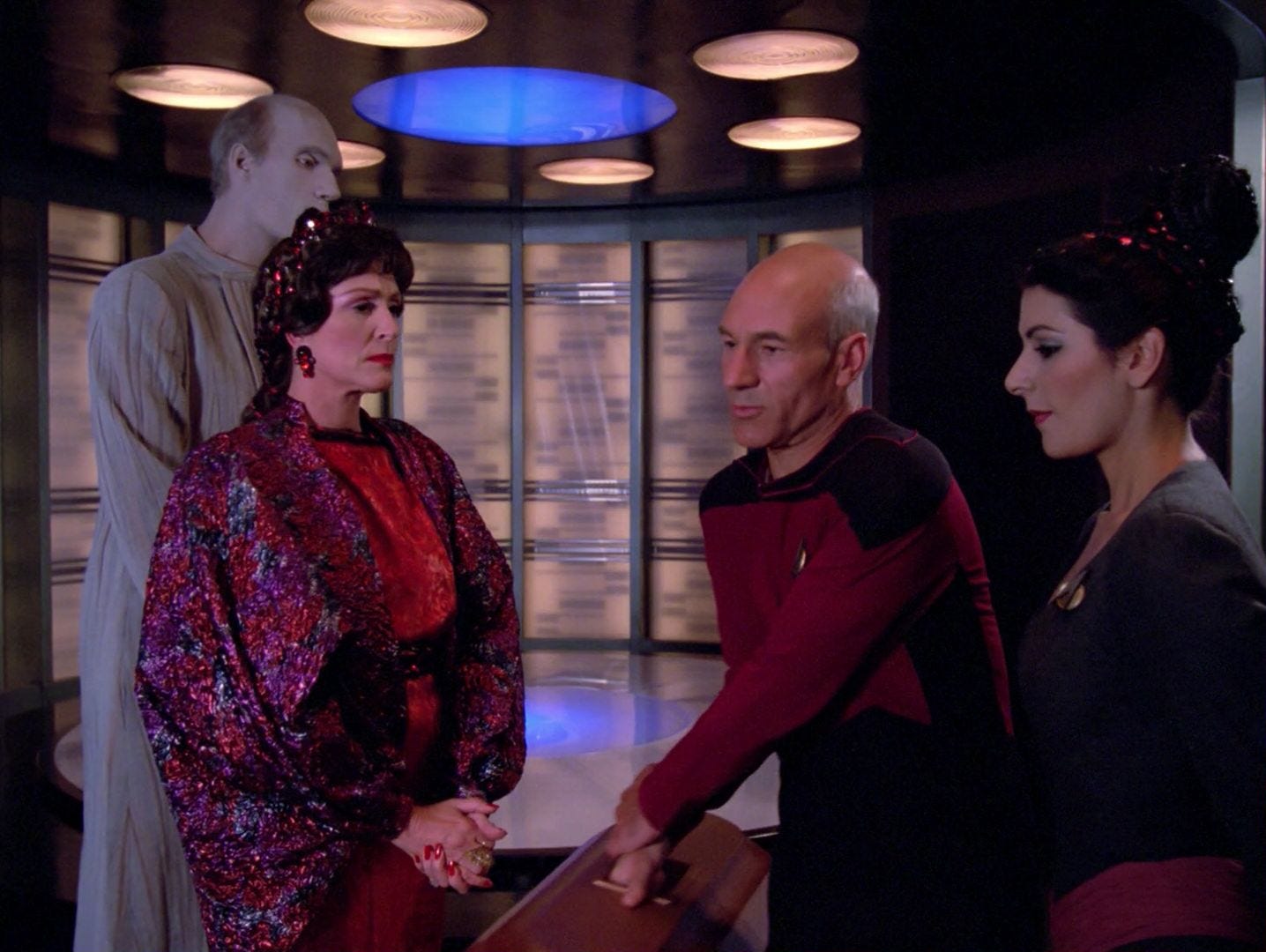
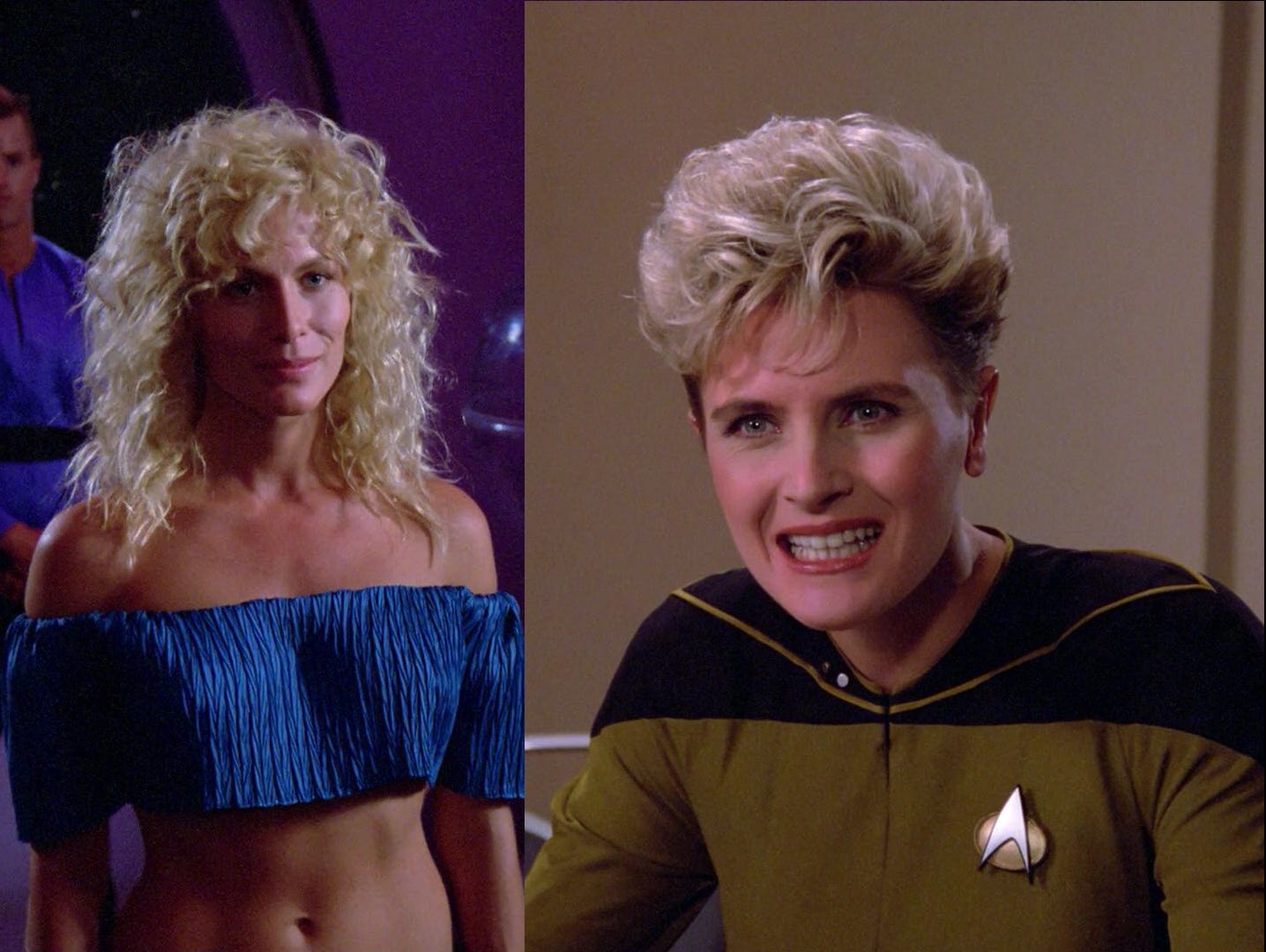
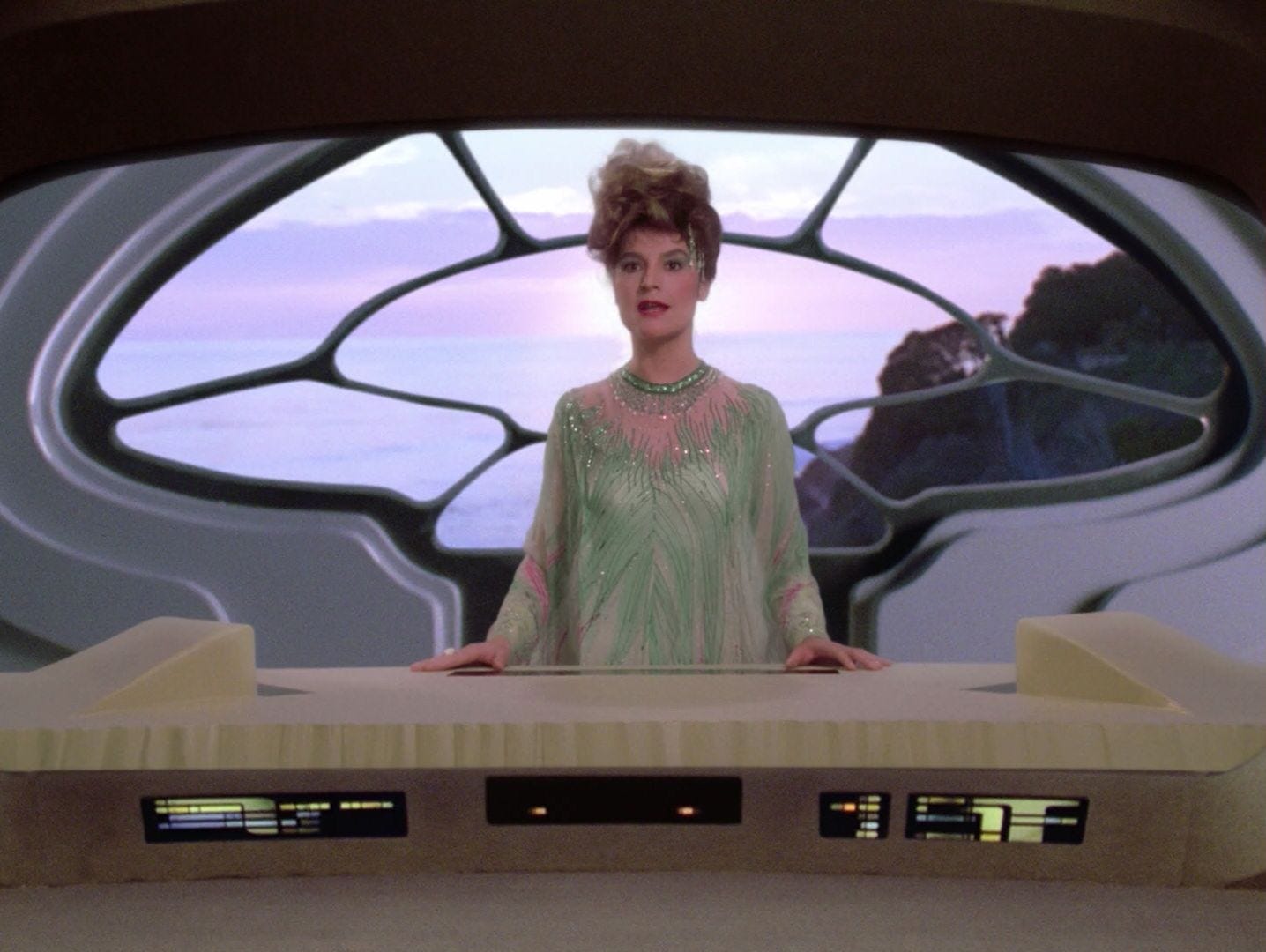
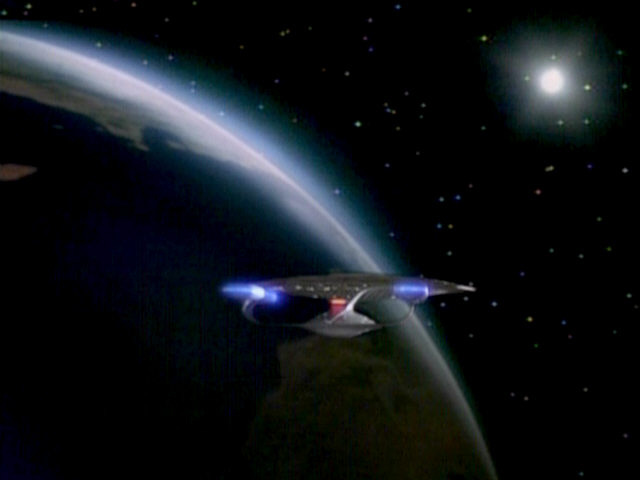

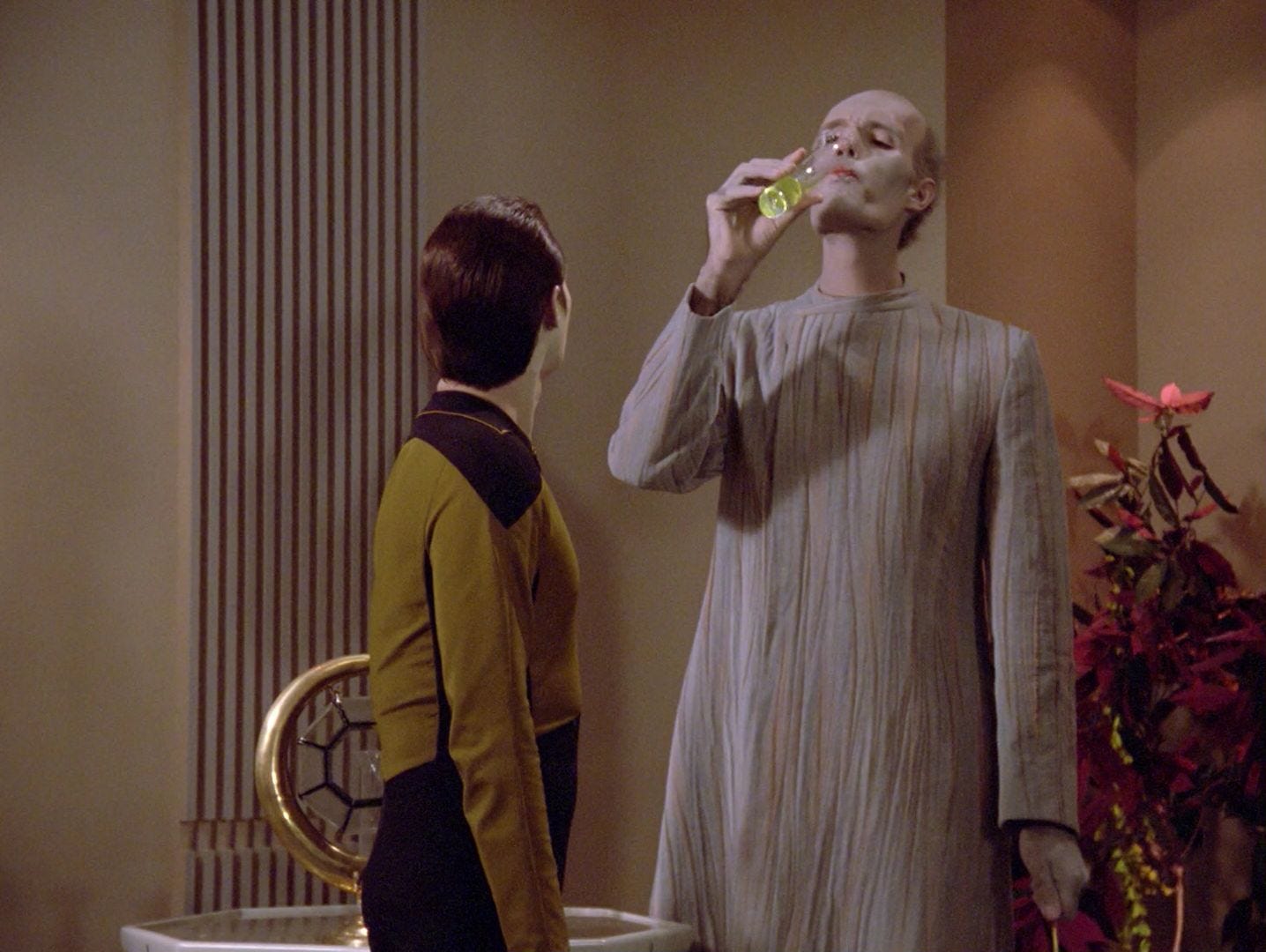
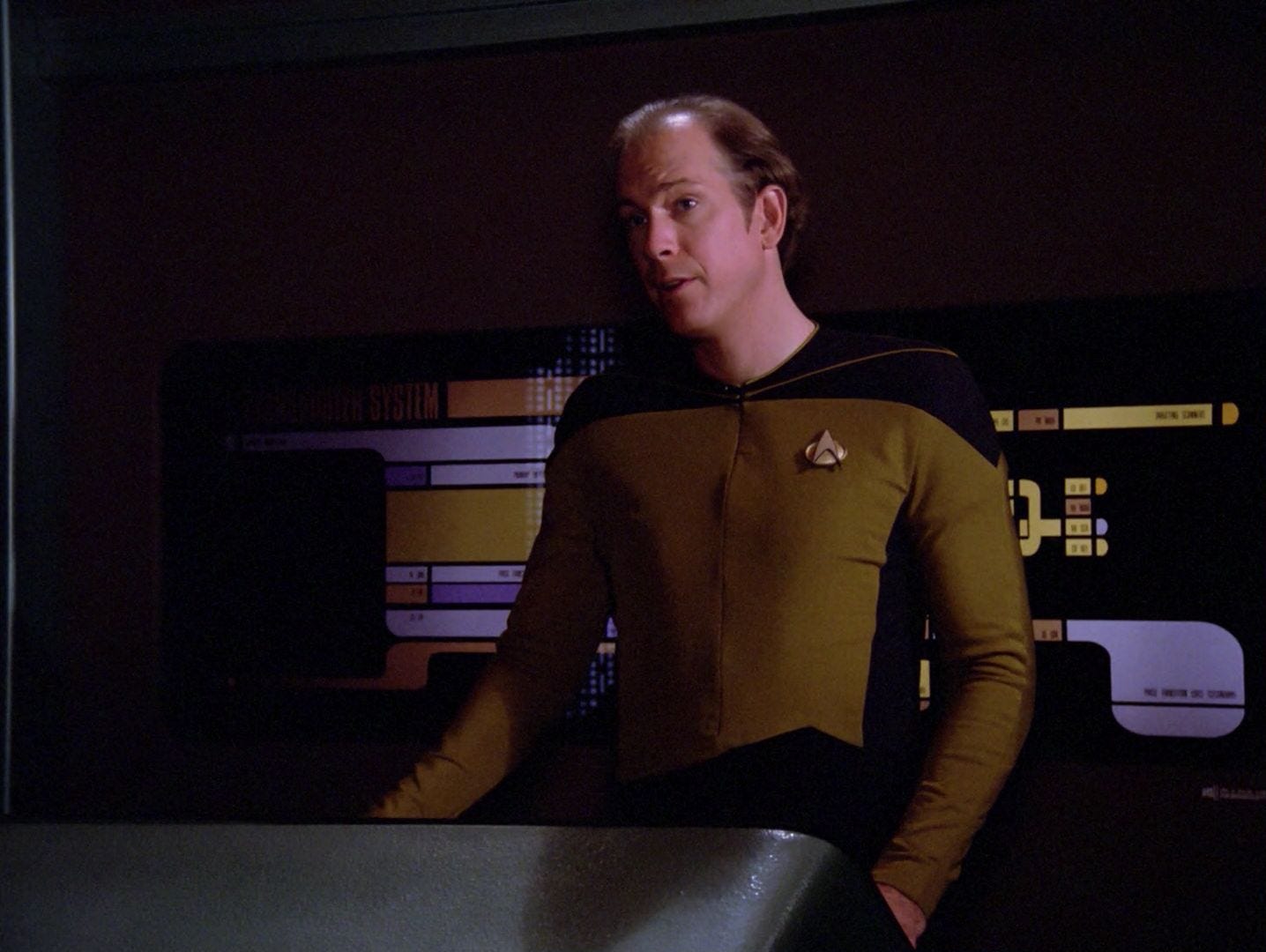
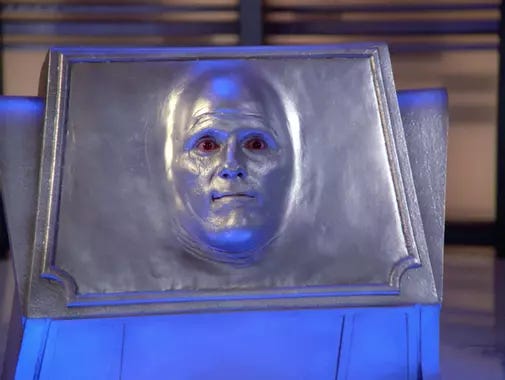

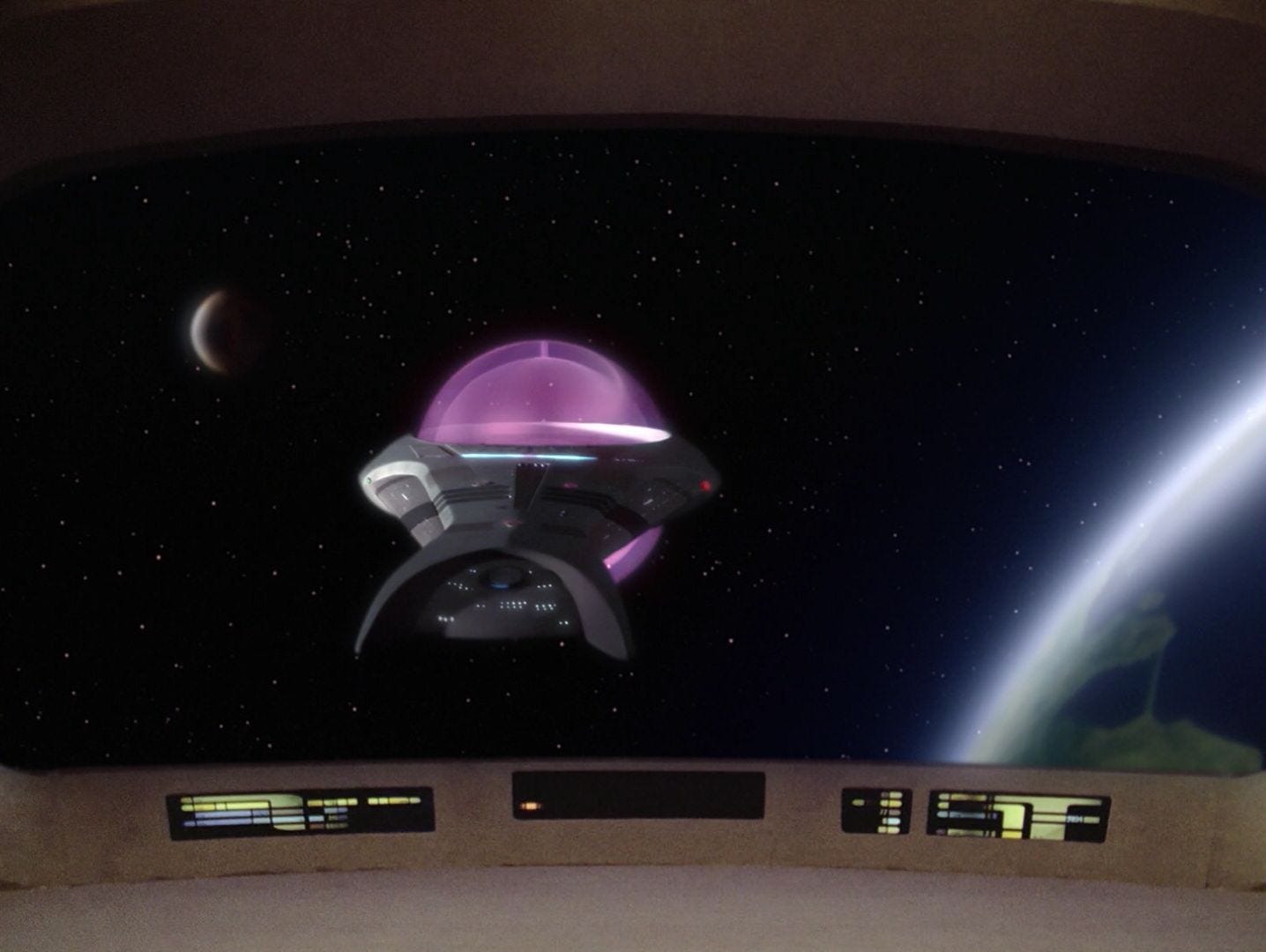
I really like this episode. It's good entertainment. Tons of things you could pick at but better to just sit back and enjoy the ride on this one!